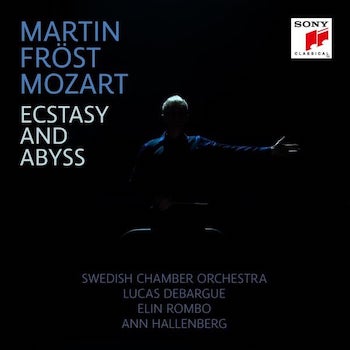Classical Album Review: Martin Fröst’s “Ecstasy and Abyss” — A Mixed Bag of Mozart
By Jonathan Blumhofer
The best items in this all-Mozart album are the concertos.

Here’s a first: an all-Mozart release that’s sure to provoke strong reactions. Martin Fröst is one of the day’s great clarinets. As a conductor? Well, let’s just say the jury’s out.
At least his new album, Ecstasy and Abyss, features some heavy-hitting fare: the “Prague” and “Jupiter” Symphonies, plus the C-major Piano Concerto No. 25 and the A-major Clarinet Concerto, as well as a pair of arias (one with clarinet obbligato).
The best items here are the concertos. This is Fröst’s third recording of the Clarinet Concerto, so it’s a safe bet he knows all the music’s ins and outs and has an uncanny grasp of just how it should go.
That he does. Playing on a basset clarinet (the instrument Mozart wrote the piece for; it has a lower range than the traditional clarinet), Fröst is entirely in his element. His is a reading that boasts nearly everything one might want in the piece: warmth, resonance, dark agility, tasteful embellishments, and a wonderful sense of direction. The Swedish Chamber Orchestra (SCO) is with him every step of the way; suffice it to say, theirs is as chamber music-like a performance of this score as you’re likely to hear.
Much the same can be said for the album’s traversal of the C-major Piano Concerto, which features Lucas Debargue in the solo role. If Debargue’s pianism can sometimes come across as quirky, here it’s broadly straightforward: pearl-toned, seamlessly voiced between the hands, and rhythmically well-defined. Perhaps the most unexpected aspect of the pianist’s performance is his own first-movement cadenza, which is fantastically engaging (if a touch expansive).
From the podium, Fröst draws pert, well-balanced accompaniments from the SCO and manages balances admirably. To be sure, the soloist is never covered and there are some lovely handoffs between the woodwinds during the finale’s syncopated tune.
Similar qualities mark his conducting in the vocal filler. The concert aria “Ch’io mi scordi di te?” — for the bizarre combination of soprano, piano, and orchestra — comes across with fresh naturalness. Soprano Elin Rombo’s silvery instrument intertwines beautifully with Debargue’s keyboard; the orchestra’s contributions are rich but discreet.
Ditto for “Parto, parto, ma tu be mio” from La Clemenza di Tito. Here, mezzo-soprano Ann Hallenberg and Fröst spin out silken webs of melody, echoing and bouncing off one another with bewitching rightness.
Given this, it comes as a bit of a surprise that, in the symphonies, Fröst is so fundamentally thrown for losses. True, he draws crisp articulations and lucid textures from his forces in the “Jupiter.” But that hardly compensates for a marked preference for mannered phrasings, softened arrival points at key structural moments, and fussy dynamic swells. Add to this an omission of the finale’s second repeat (after strictly observing all the other repeats in the score) and we’ve got a vexing misfire.
Fröst’s take on the D-major “Prague” Symphony is likewise driven and, for the most part, less stilted. Its first movement leans forward and pushes ahead — but doesn’t quite cross the line into freneticism.
The finale, on the other hand, does (though the SCO’s virtuosity through it all is impressive). Again, the problems inherent in Fröst’s “Jupiter” rear their heads here: a predilection for backing off the ends of phrases and odd rhetorical exaggerations (especially in the development) among them. The whole shebang is capped off by a savage attack — led by the timpani (of all things in Mozart!) — on the final cadence.
In the end, then, we’re left with a mixed bag. For better or worse, the disc’s engineering ensures that all of it comes across with immediacy.
Jonathan Blumhofer is a composer and violist who has been active in the greater Boston area since 2004. His music has received numerous awards and been performed by various ensembles, including the American Composers Orchestra, Kiev Philharmonic, Camerata Chicago, Xanthos Ensemble, and Juventas New Music Group. Since receiving his doctorate from Boston University in 2010, Jon has taught at Clark University, Worcester Polytechnic Institute, and online for the University of Phoenix, in addition to writing music criticism for the Worcester Telegram & Gazette.
Tagged: Ann Hallenberg, Elin Rombo, Lucas Debargue, Martin Fröst, Sony Classical
